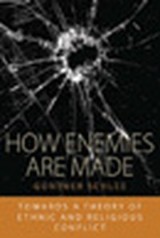Details

How Enemies Are Made
Towards a Theory of Ethnic and Religious ConflictIntegration and Conflict Studies, Band 1 1. Aufl.
|
38,99 € |
|
| Verlag: | Berghahn Books |
| Format: | EPUB |
| Veröffentl.: | 01.09.2008 |
| ISBN/EAN: | 9780857450609 |
| Sprache: | englisch |
| Anzahl Seiten: | 206 |
DRM-geschütztes eBook, Sie benötigen z.B. Adobe Digital Editions und eine Adobe ID zum Lesen.
Beschreibungen
<p> In popular perception cultural differences or ethnic affiliation are factors that cause conflict or political fragmentation although this is not borne out by historical evidence. This book puts forward an alternative conflict theory. The author develops a decision theory which explains the conditions under which differing types of identification are preferred. Group identification is linked to competition for resources like water, territory, oil, political charges, or other advantages. Rivalry for resources can cause conflicts but it does not explain who takes whose side in a conflict situation. This book explores possibilities of reducing violent conflicts and ends with a case study, based on personal experience of the author, of conflict resolution.</p>
<p> <b>PART I: INTRODUCTION</b></p>
<p> <b>Chapter 1.</b> Why we Need a New Conflict Theory<br> <b>Chapter 2.</b> The Question<br> <b>Chapter 3.</b> How this Volume is Organised</p>
<p> <b>PART II: THEORETICAL FRAME</b></p>
<p> <b>Chapter 4.</b> A Decision Theory of Identification<br> <b>Chapter 5.</b> The Necessity for Strategies of Inclusion and Exclusion<br> <b>Chapter 6.</b> The Conceptual Instruments of Exclusion and Inclusion: Social Categories and their Overlapping Relations<br> <b>Chapter 7.</b> On the Sociologisation of Economics and the Economisation of Sociology<br> <b>Chapter 8.</b> Markets of Violence and the Freedom of Choice<br> <b>Chapter 9.</b> Ethnicity Emblems, Diacritical Features, Identity Markers – Some East African Examples<br> <b>Chapter 10.</b> Purity and Power in Islamic and Non-Islamic Societies and the Spectre of Fundamentalism<br> <b>Chapter 11.</b> Language and Ethnicity</p>
<p> <b>PART III: PRACTICAL FRAME</b></p>
<p> <b>Chapter 12.</b> Conflict Resolution: the Experience with the Somali Peace Process<br> <b>Chapter 13.</b> On Methods: How to be a Conflict Analyst<br> <b>Chapter 14.</b> An Update from 2007: Reconsidering the Peace Process</p>
<p> List of Acronyms<br> References<br> Index</p>
<p> <b>Chapter 1.</b> Why we Need a New Conflict Theory<br> <b>Chapter 2.</b> The Question<br> <b>Chapter 3.</b> How this Volume is Organised</p>
<p> <b>PART II: THEORETICAL FRAME</b></p>
<p> <b>Chapter 4.</b> A Decision Theory of Identification<br> <b>Chapter 5.</b> The Necessity for Strategies of Inclusion and Exclusion<br> <b>Chapter 6.</b> The Conceptual Instruments of Exclusion and Inclusion: Social Categories and their Overlapping Relations<br> <b>Chapter 7.</b> On the Sociologisation of Economics and the Economisation of Sociology<br> <b>Chapter 8.</b> Markets of Violence and the Freedom of Choice<br> <b>Chapter 9.</b> Ethnicity Emblems, Diacritical Features, Identity Markers – Some East African Examples<br> <b>Chapter 10.</b> Purity and Power in Islamic and Non-Islamic Societies and the Spectre of Fundamentalism<br> <b>Chapter 11.</b> Language and Ethnicity</p>
<p> <b>PART III: PRACTICAL FRAME</b></p>
<p> <b>Chapter 12.</b> Conflict Resolution: the Experience with the Somali Peace Process<br> <b>Chapter 13.</b> On Methods: How to be a Conflict Analyst<br> <b>Chapter 14.</b> An Update from 2007: Reconsidering the Peace Process</p>
<p> List of Acronyms<br> References<br> Index</p>
<p> <b>Günther Schlee</b> was a Professor at Bielefeld until 1999. He currently is the director of the section Integration and Conflict at the Max Planck Institute for Social Anthropology, Halle, focusing on Africa, Central Asia, and Europe. His publications include <i>Identities on the Move: Clanship and Pastoralism in Northern Kenya</i> (International African Institute, 1989), <i>How Enemies are Made</i> (Berghahn, 2008), <i>Rendille Proverbs in their Social and legal Context</i> (with Karaba Sahado) and <i>Boran Proverbs in their Cultural Context</i> (with Abdullahi Shongolo) (both Cologne: Rüdiger Köppe).</p>
Diese Produkte könnten Sie auch interessieren:

Identifying, Assessing, and Treating Autism at School

von: Stephen E. Brock, Shane R. Jimerson, Robin L. Hansen

96,29 €

How to Become an Effective Course Director

von: Bruce W. Newton, Jay H. Menna, Patrick W. Tank

64,19 €














